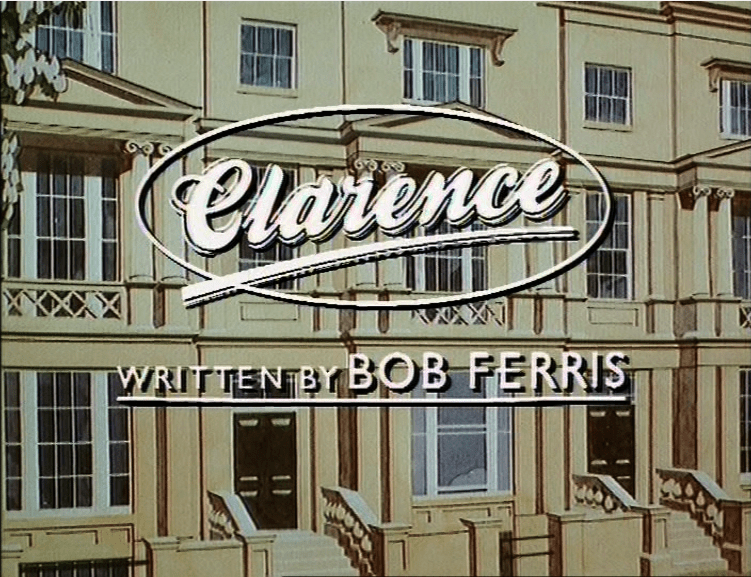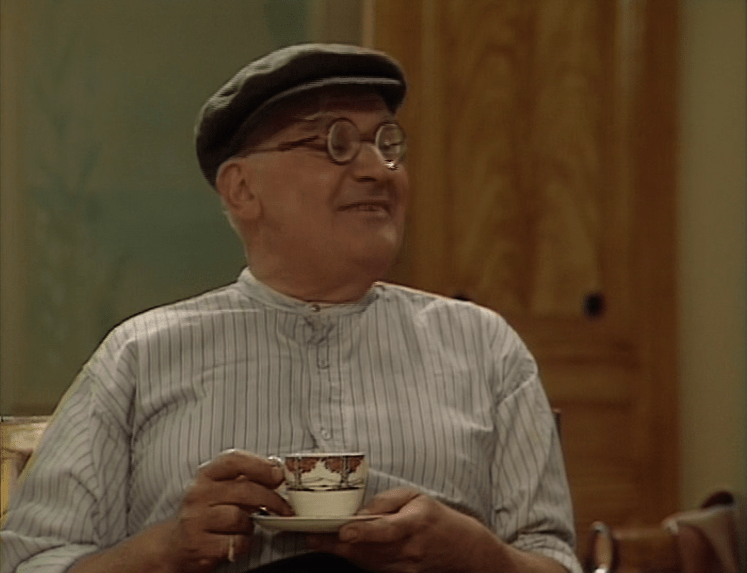
The other day, I was out on my occasional hunt for DVDs, and whilst I was out hunting in the DVD Treasure Trove that is HMV, I came across a curiosity: A DVD of the 1980s sitcom Clarence. My interest was intrigued, and I purchased the DVD with the intent to watch the entirety of the series. The show may be long forgotten and didn’t even last a series, but is it worth a watch? Let’s find out!
Background
It cannot be stated how much of a legend the writer, Ronnie Barker, is – he had worked together with Ronnie Corbett as part of The Two Ronnies and had provided some of the best performances in a sitcom playing stutterer Arkwright in Open All Hours and Prisoner Stanley Fletcher in Porridge. It was around this time however that Corbett had decided to go for retirement, fearing that his material was declining. As such, Clarence would prove to be his final sitcom – in fact, he had only decided to go for it because, as the writer (under the pseudonym Bob Ferris) of the sitcom, he was able to set it in his home of Oxfordshire.
The show itself was adapted from his 1971 series Six Dates With Barker, specifically the episode “1937: The Removals Person”. It is remarkable that even at that point, the show was basically almost fully formed, up to the point that Josephine Tewson was even already playing her character of Travers, with the only real difference being that Barker’s character was named Fred instead of Clarence in the final series.
Premise

The year is 1937 and Clarence Sale (Ronnie Barker) runs a company called “Get a Move On Removals”, working as a furniture packer working alongside a lifter named Albert (Jonathan Stratt). Despite his claims that “There ain’t nothing wrong with my eyesight” however, he has difficulty seeing, and this frames the major humour of the series, whether it be mistaking a postbox for a man, stepping on porcelain, or having an inability to drive properly.
The first episode in question involves him cleaning the house of a snooty upper-class woman as she and her daughter prepare to move to Rangoon. There, he meets her put-upon maid, a woman named Jane Travers (Josephine Tewson) who’s there as their maid. Despite poor first impressions (laughing at her misfortunes involving a fiancee running off with another man probably won’t win you any favours), she comes to appreciate his slightly colourful sense of humour and he decides to marry her.

There is a complication, however – although she considers the offer, she wants to have a trial period of living together but sleeping separately to ensure that they’re compatible. This is something made easier by the fact that her aunt has passed away, leaving her an old cottage in Oxfordshire which they use to test their relationship.
The show itself stands out from the fact that it’s one of those rare sitcoms during the time which has a serialised plot – namely the blossoming romance between Clarence and Travers, a plot in which Travers keeps the viewer up to speed at the start of each episode other than the first. Said plot eventually ends with Travers deciding to marry him after all and the final scene of the series is the soon-to-be-married couple walking off in the direction of their wedding.
What did the critics think of it?
Most critics were quite lukewarm towards the show. The “Sandwell Evening Mail” called it a clumsy attempt at comedy and suggested that it was too predictable and tilted too much towards the period filming. “The Daily Telegraph” meanwhile called it “a one-joke affair, and a rather silly one at that”, “The Guardian” called it “undistinguished” and the “Burton Mail” called it “not a note on which to retire”. That said, it wasn’t all bad – The “Cambridge Evening News” did seem to be optimistic that it would become a cult hit, even if this optimism would prove to be unfounded.
In the end, whilst the numbers seem to have been decent for its home channel of BBC2- the “Burton Mail” stated that the viewing figures for episode one were 10.50 million – a second series was not to be, as Barker was intending to retire anyway. Nonetheless, he was disappointed with it. As his long-running co-star, Ronnie Corbett put it in his book And It’s Goodnight From Him …: The Autobiography of the Two Ronnies“:
It wasn’t a serious matter, as there could now never be a second series, but the character was rather close to his heart, and he would have liked to have gone out with a bang. It wasn’t exactly a whimper, but the public reaction was a bit lukewarm.
I think there was more than one reason for this. Partly it was due to the fact that, by Ronnie’s very highest standards, it wasn’t as rich a piece as Porridge or Open All Hours. It was too reliant on the one joke, Clarence’s short-sightedness. That on its own would not necessarily have been serious – after all, the fact that Some Mothers Do ’Ave ’Em was entirely dependent on the clumsiness and physical ineptitude of the character so memorably played by Michael Crawford didn’t stop it being a major success. But the public knew that Ronnie had retired. It was not in their best interests to become too fond of this new character, as there would never be another series. Also, Ronnie had consigned himself to history. He was in the past. Later, nostalgia would set in, but it was too soon for that.
Nowadays, the show is basically forgotten, surprising considering the successes of Barker’s other sitcoms. Looking back at the sitcom, Mark Lewisohn, writing for the Radio Times Guide to TV Comedy described the show as an “efficient enough sitcom, and pleasingly beyond the mainstream, but Barker had been in better.”
Thoughts

I think the thing that came to mind when watching this show was “Mr Magoo, but as a romantic comedy”, which leads us to our first issue – the show is way too reliant on the gag that Clarence is near-sighted. It does make for some good physical comedy, like how the time he accidentally proposes to the wrong person in Episode 1, but it does wear itself thin by the end of the series, is a bit too broad for a sitcom airing on BBC2, and hinders needed development between the characters – a bit of a necessary task considering the fact that this is meant to be a romantic comedy.
The result is that whilst the show does develop Travers enough that I can see why she would go for Clarence (although I would have liked it if the show explored more of her loneliness in life), the show doesn’t do enough to make Clarence likeable enough that you would want him to be with Travers – for one thing, he has a tendency to keep nagging her about marrying him and this, combined with his sometimes insensitive comments and his near-blinded tendency to create chaos, does make it difficult to see him as the right man for Travers.
Interesting to note as well – Travers and Clarence are the only two main characters, with everyone else being one-shot characters. It does allow them the opportunity to give them the space needed to develop, although as mentioned below, the reliance on sight gags cancels out this advantage.
What does save this show however is the chemistry between the two actors – Barker brings charm to his role as the hapless and blindness-ignoring furniture packer, whilst Tewson brings credibility to her role as the lonely woman hoping for a companion whilst wondering if she’s made the right decision to be with this man. There is also a lovely gentleness to the romance as well which makes it the strongest element of the series, especially once it begins to click in the final episodes.
Attention must also be made to the beautifully painted scenes in each episode (some of which I put down below), which help to evoke the feel of the countryside in the 1930s.



Best Episode
Episode 6 – whilst I would have liked it if they had focused on Clarence’s wedding in that episode, the actual plot isn’t too bad. There’s a nice rapport going on between Clarence and Mrs Titheridge (Gwen Nelson), we see Clarence show a more pleasant side when he mentions how he’s going to take care of Travers and be a good husband, and there is a nice comic situation where he ends up peddling Titheridge’s wheelchair under the belief that it’s currently being occupied.
Conclusion
It is a decent enough show and quite the hidden gem, but it definitely doesn’t rise up to some of the greats that Barker has produced in his lifetime and was a premise which probably wouldn’t have survived for very long even if Ronnie Barker was up for more in the end.
At the same time, however, it is worth a watch, even if it isn’t rewatch material.
If you’re curious to watch this old sitcom, it has been released on DVD which you can buy here. Additionally, the whole series has been put up on Youtube courtesy of “Professor Cynic” – a link to the first episode can be found below.
